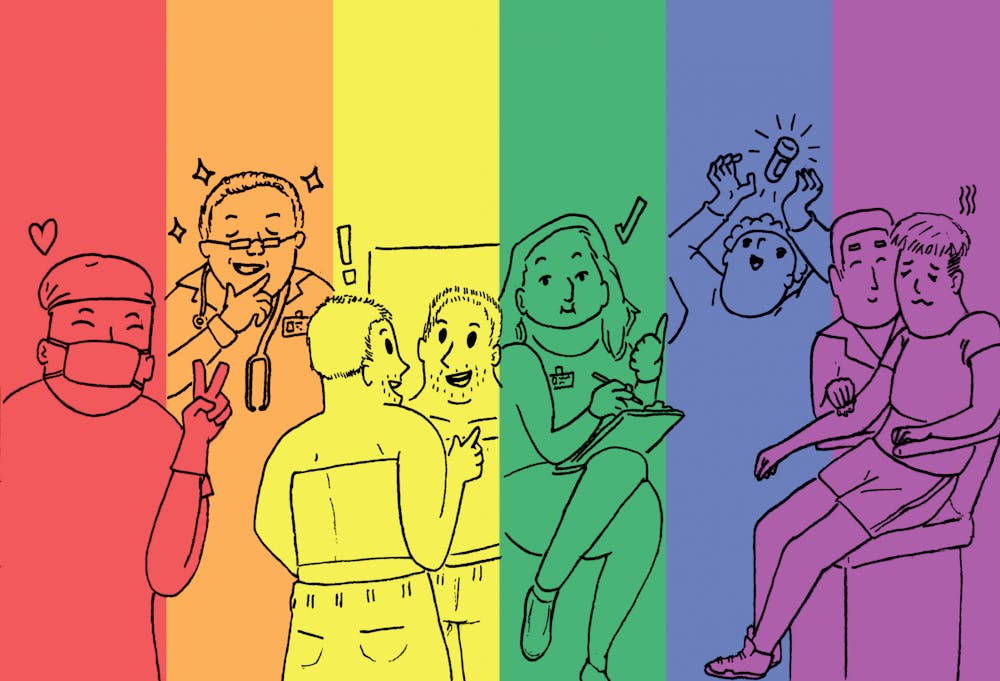A group of students at the IU School of Medicine surveyed LGBTQ+ Indiana residents during the fall semester about their health care needs and experiences. The survey was designed to help the students establish a free LGBTQ+ health clinic in Bloomington.
Keeley Newsom, a second-year medical student who co-led the effort for the study and the clinic, said the main purpose of the study, which received 312 responses, was to identify health care gaps in the region for those identifying as LGBTQ+ so that the clinic she and her classmates are seeking to establish integrates well into the resources that already exist.
One of the barriers to health care access the survey found for the Bloomington LGBTQ+ community is a lack of trust over the medical provider respecting the patient’s identity. Newsom said the survey found more than 50% percent of all individuals surveyed who identify themselves as transgender and about 30% of those identifying themselves as lesbian, gay or bisexual reported they delayed receiving medical care because they fear facing discrimination from their providers or other health care staff.
“It can really impact health outcomes if you don’t have that safe spot,” she said. “Because going to a physician — that’s such a vulnerable position you’re in. You’re half-naked in a room with this person poking around you and asking you questions.”
Newsom said the survey also found less than half of those surveyed report having an LGBTQ+ welcoming provider, defined by the study as one who is competent in LGBT health and who the patient feels they can be open with regarding their sexual orientation or gender identity. She said many respondents reported not revealing their identity to their providers because they are uncertain about if that would affect the quality of care they receive.
Dr. Juan Carlos Venis, assistant professor of clinical family medicine at Indiana University School of Medicine, said physicians’ use of inaccurate terminology such as referring to being gay as a lifestyle can discourage LGBTQ+ patients from accessing the care they need.
LGBTQ+ patients’ access to necessary care is made more difficult in some cases where providers attempt to intervene and change the patients’ sexual orientation or gender identity, Dr. Venis said. He said he has heard several anecdotes of providers in Indiana not accepting their LGBTQ+ patients’ identity and, in some instances, trying to convert it through religious intervention.
The 2015 United States Transgender Survey found in Indiana that 11% of respondents “reported a professional, such as a psychologist, counselor, or religious advisor, tried to stop them from being transgender.”
“We shouldn’t rely on our patients to be our teachers,” Dr. Venis said.
Providers should do all they can to be fully informed about their LGBTQ+ patients’ specific needs, he said.
Newsom and her team’s survey found that mental health care was the service respondents said they would most benefit from, followed by treatment for chronic conditions, immunization, annual wellness exams and treatment of acute symptoms. She said these health care needs are similar to those of the non-LGBTQ+ population.
But stigma and biases against the LGBTQ+ community and social inequality further exacerbate the patients’ lack of access to quality care, said Andrea Janota, interim director of the Extension for Community Healthcare Outcomes Center at the Richard M. Fairbanks School of Public Health at IU-Purdue University Indianapolis.
According to the 2020 LGBTQ+ Needs Assessment for the Greater Indianapolis Area, 20% struggle to have enough food to eat and 30% struggle to have enough money to access quality health care.
Janota said workplace discrimination against employees identifying as LGBTQ+ means some are more likely to be unemployed or underemployed, and therefore uninsured for health care. She said the COVID-19 pandemic builds to the LGBTQ+ community’s cumulative disadvantage in access to health care, since a little less than half of the community works in highly-affected industries such as food services, K-12 and higher education, hospitals and retail, compared to about 25% for the U.S. population.
Sean Buehler, a third-year medical student at the School of Medicine who led the survey and the effort to found a student-led clinic with Newsom, said they had the idea of a student-led outreach clinic in Bloomington for a while already, and listening to the negative experiences from their friends within the LGBTQ+ community in Bloomington prompted their project of a free LGBTQ+ health clinic.
“We have a vibrant LGBTQ community and many allies in town, a world-renowned human sexuality research center in the Kinsey Institute, and a soon-to-be brand new Regional Academic Health Center,” he said. “It seems like the perfect storm of opportunities to make it work.”
Newsom said their effort is still at a preliminary stage and the next step is to present their findings to the School of Medicine shortly after Jan. 1. They are also looking for physicians to oversee the clinic’s operations.






